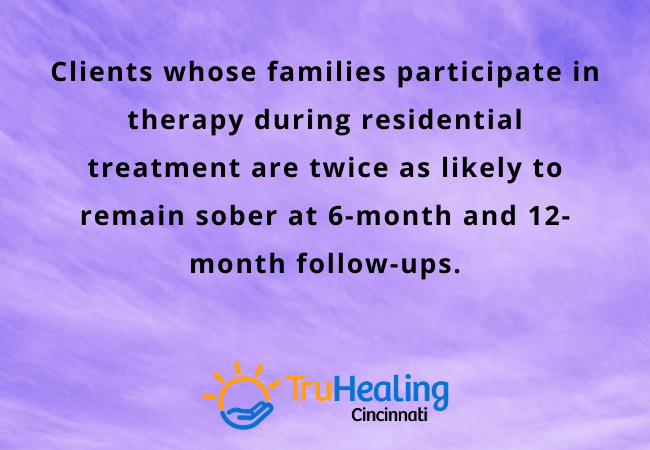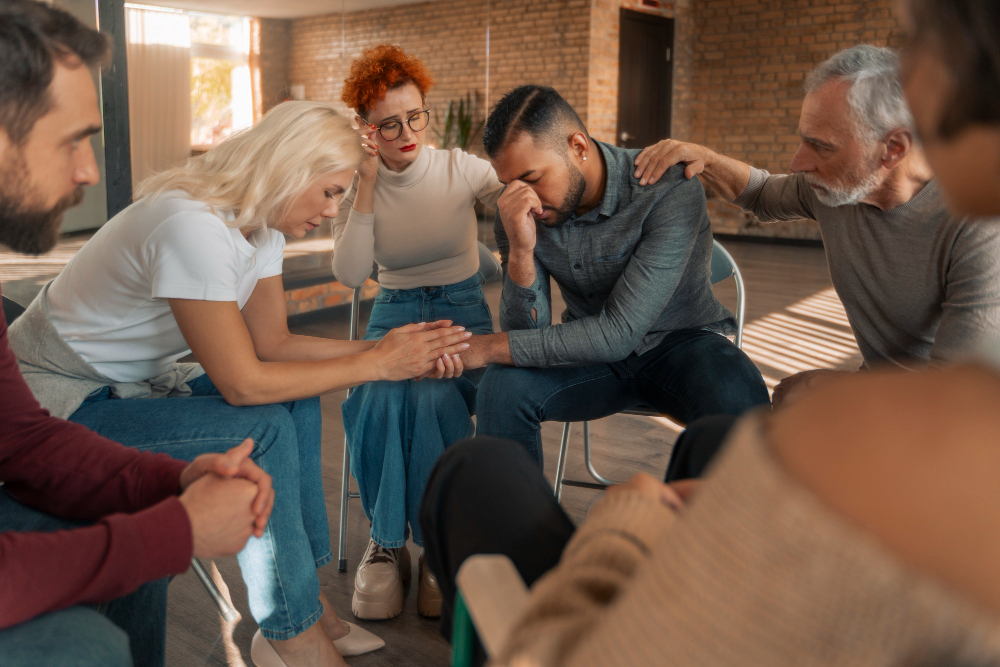Addiction is a disease that doesn’t just affect the individual — it affects everyone close to them. Families often bear the emotional weight of watching a loved one spiral through substance use, facing broken trust, betrayal, distance, and heartbreak.
At TruHealing Cincinnati, we understand that healing doesn’t happen in isolation. True, lasting recovery requires rebuilding the relationships that matter most. That’s why our Residential Treatment Program in Cincinnati, Ohio includes dedicated family support services to help restore connection, rebuild trust, and repair the emotional fabric torn by addiction.
Whether you’re seeking care for yourself or a loved one, this blog explores how residential treatment is a critical part of family healing and why families are essential in the long-term recovery process.
Addiction and the Breakdown of Family Trust
Opioid and other substance addictions often lead to behaviors that damage relationships:
- Lying about use or whereabouts
- Stealing money or valuables
- Failing to follow through on commitments
- Emotional withdrawal and irritability
- Legal or financial problems that create stress
These behaviors can result in family members feeling hurt, resentful, confused, and afraid. Over time, the trust that once held the family together becomes fractured — sometimes completely broken.
But trust can be rebuilt. Through structured Substance Abuse Treatment in Cincinnati, Ohio, clients can begin to show consistency, honesty, and growth — which are key to mending family relationships.
Why Residential Treatment Creates Space for Family Healing
Residential treatment provides the right environment to begin rebuilding trust:
- Clients are in a controlled, substance-free setting
- They have space to reflect without external chaos
- Therapists can guide structured, healthy communication
- Families have access to support and education
At TruHealing Cincinnati, we offer a full continuum of care — from Medical Detox Program Cincinnati, Ohio to Partial Hospitalization Treatment in Cincinnati, Ohio and Intensive Outpatient Treatment in Cincinnati, Ohio — with consistent family involvement at every level.
How Family Therapy Works in Residential Treatment
Family therapy is a vital part of our Residential Treatment Program in Cincinnati, Ohio. It offers a safe, therapeutic space where individuals and their loved ones can:
- Express emotions in a healthy way
- Identify dysfunctional patterns
- Set new boundaries and expectations
- Learn about addiction as a disease
- Begin repairing broken lines of communication
Common topics in family therapy include:
- Rebuilding trust through consistent behavior
- Apologies and amends
- Understanding enabling vs. healthy support
- Learning to forgive — and be forgiven
- Creating a post-treatment plan as a family
Rebuilding Trust: Actions Speak Louder Than Words
One of the most powerful parts of residential treatment is the time and structure it gives individuals to demonstrate change — not just promise it.
How clients show they’re rebuilding trust:
- Showing up for therapy consistently
- Being honest about relapse risks and urges
- Writing letters or initiating sincere apologies
- Committing to post-treatment plans (e.g., IOP or support groups)
- Accepting accountability, even when it’s hard
At our Addiction Treatment Center in Cincinnati, Ohio, these real-time actions allow family members to begin seeing their loved one in a new light — not as an addict, but as a person in recovery.
The Family’s Role in Recovery Success
Family support is one of the strongest predictors of long-term recovery success. When loved ones are involved in treatment — especially through residential programs — outcomes significantly improve.
Supportive families help by:
- Attending family therapy or education sessions
- Setting healthy boundaries
- Encouraging continued care like Intensive Outpatient Treatment in Cincinnati, Ohio
- Participating in peer-support groups for families (e.g., Al-Anon)
- Offering patience during setbacks and relapses
We equip families with tools to support without enabling, and love without losing themselves in the process.
Addressing Co-Dependency and Enabling Behaviors
Residential treatment doesn’t just help the individual — it also addresses unhealthy patterns that may have developed in the family system, such as:
- Co-dependency: Losing yourself in your loved one’s addiction
- Rescuing behavior: Shielding the person from natural consequences
- Emotional burnout: Neglecting your own needs out of guilt or fear
Through therapy and education, we help families build resilience, assertiveness, and emotional boundaries — essential tools for both recovery and personal well-being.
From Silence to Communication — Relearning How to Talk as a Family
Addiction often leads to secrecy, defensiveness, and emotional shutdown — both from the person struggling and their loved ones. In residential treatment, one of the most powerful changes is helping families talk again in healthy, respectful ways.
How communication is restored:
-
Guided family sessions to safely express hurt, anger, and hope
-
Replacing blame with “I” statements and emotional honesty
-
Learning to listen without reacting or interrupting
-
Exploring each family member’s role in recovery moving forward
By the time individuals transition to Partial Hospitalization Treatment in Cincinnati, Ohio or Intensive Outpatient Treatment in Cincinnati, Ohio, many families are communicating more openly and lovingly than they have in years.
Healing Across Generations
Opioid and alcohol addiction often affect more than one generation — especially in families with long-standing cycles of trauma, untreated mental illness, or addiction.
Residential Treatment breaks that cycle by:
-
Helping parents become present and dependable again
-
Allowing children to witness consistency and change
-
Encouraging older family members to process grief, anger, or guilt
-
Offering support and education to siblings or extended relatives
Families don’t just heal backward — they heal forward. At TruHealing Cincinnati, we believe that when one person gets well, the whole family has a chance to thrive.

Family Education: Understanding the Disease of Addiction
Families often come into treatment carrying misconceptions: that addiction is a moral failing, that it’s a choice, or that recovery should be “quick.” Education changes that narrative.
Topics covered in family education:
-
How addiction hijacks the brain
-
The science of cravings, withdrawal, and relapse
-
The difference between support and enabling
-
The emotional rollercoaster of early sobriety
-
The importance of ongoing Drug Addiction Treatment in Cincinnati, Ohio
Knowledge reduces shame, blame, and judgment — and helps loved ones become allies in healing.
Planning for Reconnection After Residential Treatment
The transition out of residential care is a sensitive time — not only for the individual, but also for the family. Our team ensures everyone is prepared for what’s next.
What reconnection planning includes:
-
Collaborative discharge planning with the family
-
Boundaries and expectations for re-entry to the home
-
Recommendations for continued family therapy
-
Connection to community-based support for spouses, parents, or children
-
Safety plans in case of relapse
At TruHealing Cincinnati, healing is never “one and done.” It’s a journey — and families are part of every phase.
Family Healing Is a Process — But It’s Possible
Healing isn’t linear. Families may go through stages:
- Shock or Denial: “I can’t believe this is happening.”
- Anger or Blame: “Why did they do this to us?”
- Grief or Sadness: “I miss the person they used to be.”
- Acceptance and Hope: “They are getting help, and we can heal together.”
At TruHealing Cincinnati, our residential program supports families through every stage of this journey — with empathy, structure, and professional guidance.
Conclusion
Addiction may have fractured your family, but recovery can begin the process of repair. At TruHealing Cincinnati, our Residential Treatment Program in Cincinnati, Ohio isn’t just about helping the individual — it’s about restoring relationships and rebuilding trust.
Through clinical therapy, structured healing, and compassionate guidance, we help families reconnect and recover together — one honest conversation at a time. Call us today at 513.643.9118 to learn how our opioid and substance abuse treatment programs can support your entire family.
Frequently Asked Questions
Can family visit during residential treatment?
Yes, at designated times and depending on clinical guidelines. We also offer virtual family therapy sessions when needed.
What if my loved one isn’t ready to involve us?
That’s okay. We meet clients where they are. Family involvement often grows as trust rebuilds.
Can I get help for myself while my loved one is in treatment?
Absolutely. We connect families to support groups and educational resources tailored to your needs.
What happens after residential treatment?
We help build a continuing care plan that includes Partial Hospitalization Treatment in Cincinnati, Ohio, Intensive Outpatient Treatment, family therapy, and long-term peer support.

